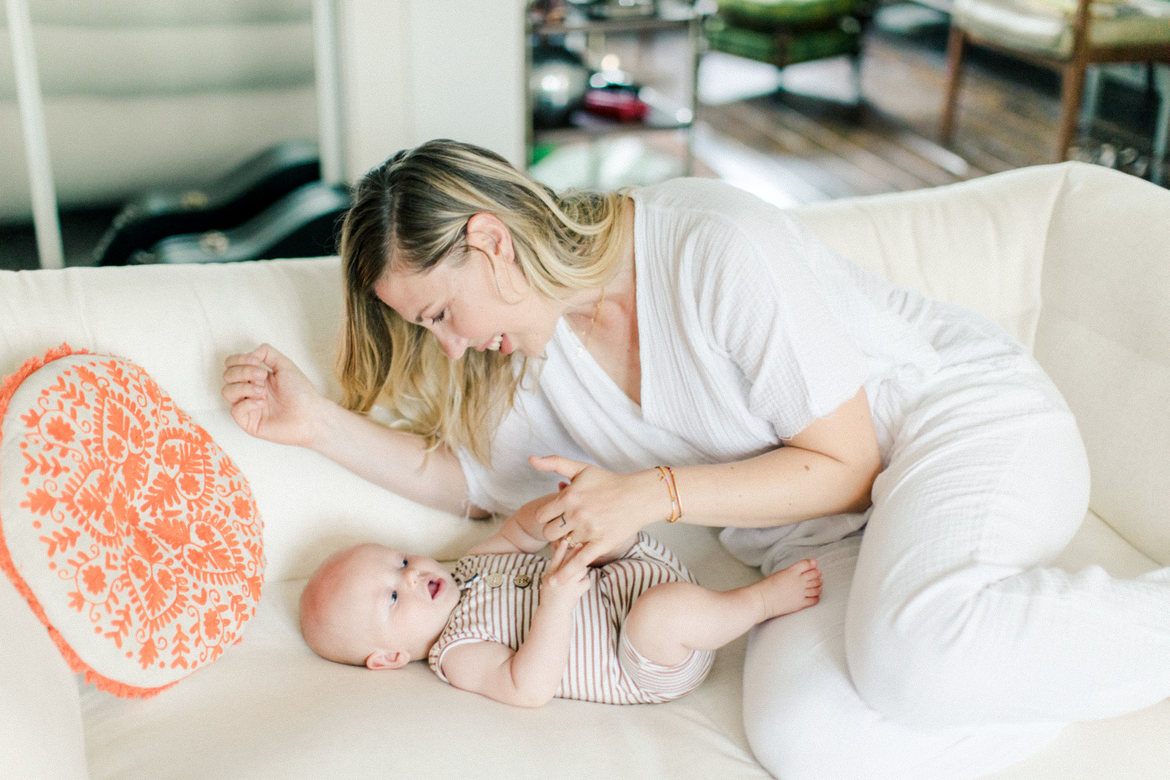By Sarah Palmer
So, your baby is 4 months old and you’re wondering what the heck you’ve gotten yourself into? Or maybe you’re about to hit this dreaded 4 month sleep regression and you’re terrified because everyone’s telling you how awful it is. Let me talk you through what I call sleep PROgressions and what happens for your baby when they’re 4 months old.
What are sleep progressions?
By now, you’ve probably heard of sleep regressions. Well, as Baby-Led Sleep and Well-Being Specialists we call them sleep PROgressions. This is because what actually occurs during these periods are growth and a PROgression of brain development. Language is so powerful and if we go into these phases with the perception that things are going backwards, we can do ourselves (and our babies) the disservice of missing the incredible leaps and bounds they are making and how their whole world is changing. During phases of developmental, neurological and physical progression, sleep can typically become interrupted, and this is the part that we tend to focus on. Largely because it’s what sleep training culture tells us – that our baby’s sleep is a problem that needs to be fixed (which is not true). However, if we were able to focus on the incredible ways our little one is growing and learning (while also accepting that we’re going to get less sleep), it all seems a bit less intimidating and can actually become something to celebrate, rather than fear.
During phases of developmental, neurological and physical progression, sleep can typically become interrupted, and this is the part that we tend to focus on. Largely because it’s what sleep training culture tells us – that our baby’s sleep is a problem that needs to be fixed (which is not true).
What can you expect during a sleep progression?
The first thing to note is that any information about baby sleep and development should be taken as a GUIDE only – the timeframes are very general and can have huge variance from baby to baby, and the way a baby experiences these phases will be largely dependent on their temperament. The most common things families experience during this developmental phase:
- Naps can become a struggle
- More night wakings (often excessive) and unsettled sleep
- Needing a lot of input to get to sleep, especially feeding to sleep and needing motion
- More feedings
- Seeking more closeness and comfort
- Your little one may not respond as well to the ways you usually put them to sleep
- Clingy during the day and want to be in your arms all the time
- It can be a time of doubt and fear for parents, amplified by significant and ongoing sleep deprivation
What actually happens developmentally during the 4 month sleep progression?
- If you are breastfeeding, your supply changes from being hormonally driven, to becoming a pattern of supply and demand, so your baby will be working to tell your breasts how much milk they need in order to establish and maintain your supply.
- Your little one loses their stimulus barrier (which they are born with to help adjust to the overwhelming life outside!) – so they are becoming more aware of their world. When they wake up, they may be able to hear or see something that they couldn’t before they went to sleep!
- Many babies are starting to become more mobile and moving towards the first big motor milestone of rolling. This therefore coincides with also having to navigate getting your baby out of the swaddle and that is a challenging transition of its own (check out this blog for tips on this).
- Your baby’s sleep structure is also going through BIG changes – their sleep cycles are maturing and becoming more like an adult’s (although they still have a way to go).
It is also very important to see this phase through the eyes of your baby.
This is a time where parents can really struggle and often where they will be told to consider sleep training to help them cope with the sleep deprivation. The blame is often placed on parents for “spoiling” the baby and there can also be blame placed on the baby for being “too attached and clingy” (which sees us thinking there’s something wrong with them and as a result we think “what am I doing wrong?”). Parents are bombarded with instructions of getting their baby to self-soothe and that you need to put them down drowsy, but awake, so that they can learn to fall asleep independently, and then they’ll also start to sleep through the night.











